
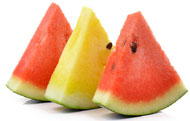
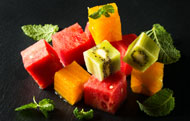
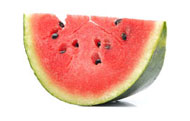
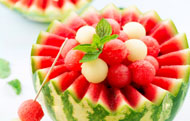

1. Watermelon Facts
2. Types of Watermelon
3. Nutritional Value of Watermelon
4. Health Benefits of Watermelon
The watermelon (Citrullus lanatus) is a species of flowering plant in the family Cucurbitaceae, that has a large, edible fruit. It is a scrambling and trailing vine-like plant, and is widely cultivated worldwide, with more than 1,000 varieties.
Watermelons are grown in favourable climates from tropical to temperate regions worldwide for its large edible fruit, which is a berry with a hard rind and no internal divisions, and is botanically called a pepo. The sweet, juicy flesh is usually deep red to pink, with many black seeds, although seedless varieties exist. The fruit can be eaten raw or pickled, and the rind is edible after cooking. It may also be consumed as a juice or an ingredient in mixed beverages.
Kordofan melons from Sudan are the closest relatives and may be progenitors of modern, cultivated watermelons. Wild watermelon seeds were found in Uan Muhuggiag, a prehistoric site in Libya that dates to approximately 3500 BC. In 2022, a study was released that traced 6,000-year-old watermelon seeds found in the Libyan desert to the Egusi seeds of Nigeria, West Africa. Watermelons were domesticated in Sudan and cultivated in Egypt by 2000 BC, although they were not the sweet modern variety. Sweet dessert watermelons spread across the Mediterranean world during Roman times.
History and Origin
Watermelons originated in Africa, with wild relatives still growing there today, and were first cultivated about 5,000 years ago in regions like Sudan or Egypt. Early varieties were likely bitter and used for their water content, before being gradually bred for sweetness as they spread across the Mediterranean during Roman times. They reached China by the 10th century and the Americas in the 17th century.
Watermelons can be categorized by their size, including picnic (large), icebox (medium), and mini (small) types. Other classifications include seedless varieties, which lack mature black seeds, and types with unique flesh colours like yellow and orange watermelons. Popular named varieties include 'Crimson Sweet', 'Charleston Gray', and 'Moon and Stars'.
By size
Picnic watermelons: These are the large, traditional watermelons, often weighing 15 to 45 pounds, that are great for gatherings.
Icebox watermelons: Smaller varieties that fit easily in a refrigerator, typically weighing 5 to 15 pounds.
Mini watermelons: Also called personal watermelons, these are small and round, usually weighing 1 to 7 pounds.
By seed content
Seedless watermelons: These are a popular choice for convenience and are created by crossing diploid and tetraploid plants, resulting in a triploid, seedless fruit.
Seeded watermelons: Traditional watermelons with mature black seeds.
By flesh colour
Red-fleshed watermelons: The most common type, with varieties like 'Crimson Sweet' and 'Jubilee'.
Yellow and orange watermelons: These offer a unique and often sweeter flavour. Examples include 'Sunshine', 'Desert King', and 'Golden Midget'.
Other classifications
Heirloom watermelons: Traditional varieties passed down through generations, such as 'Georgia Rattlesnake' and 'Moon and Stars'.
Specific named varieties: Many named varieties exist, each with unique characteristics, such as 'Sugar Baby', 'Black Diamond', and 'Orangeglo'
Fruit ” Watermelon ” ( Nutritional value )
Nutritional value per 100 g
Melons, watermelon, raw
|
Nutrient ( Proximate’s )
|
Unit
|
Value
|
Daily Value %
|
|
Energy
|
kcal
|
||
|
Protein
|
g
|
0.9
|
1.8%
|
|
Total lipid (fat)
|
g
|
0.2
|
0.2%
|
|
Carbohydrate, by difference
|
g
|
7.55
|
2.7%
|
|
Fiber, total dietary
|
g
|
0.4
|
1.4%
|
|
Sugars, total
|
g
|
6.2
|
|
|
Minerals
|
|||
|
Calcium, Ca
|
mg
|
7.00
|
0.5%
|
|
Iron, Fe
|
mg
|
0.24
|
1.3%
|
|
Magnesium, Mg
|
mg
|
10.00
|
2.3%
|
|
Phosphorus, P
|
mg
|
11.00
|
0.9%
|
|
Potassium, K
|
mg
|
112.00
|
2.3%
|
|
Sodium, Na
|
mg
|
1.00
|
0.4% |
|
Zinc, Zn
|
mg
|
0.10
|
0.9%
|
|
Copper, Cu
|
mg
|
0.04
|
4.4%
|
|
Manganese, Mn
|
mg
|
0.038
|
1.6%
|
|
Selenium, Se
|
mcg
|
0.40
|
0.7%
|
|
Fluoride, F
|
mcg
|
1.5
|
|
|
Vitamins
|
|||
|
Vitamin C, total ascorbic acid
|
mg
|
8.1
|
9%
|
|
Thiamin (B-1)
|
mg
|
0.033
|
2.7%
|
|
Riboflavin (B-2)
|
mg
|
0.021
|
1.6%
|
|
Niacin (B-3)
|
mg
|
0.178
|
1.1%
|
|
Pantothenic acid (B-5)
|
mg
|
0.221
|
4.4%
|
|
Vitamin B-6
|
mg
|
0.045
|
2.6%
|
|
Vitamin B-12
|
mg
|
0.00
|
|
|
Folate DFE (dietary folate) (B-9)
|
mcg
|
3.00
|
0.7%
|
|
Vitamin A, RAE (retinol)
|
mcg
|
28.00
|
3.1%
|
|
Vitamin E (alpha-tocopherol)
|
mg
|
0.00
|
|
|
Vitamin D (D2 + D3)
|
mcg
|
0.00
|
|
|
Vitamin K (phylloquinone)
|
mcg
|
0.1
|
0.8%
|
|
Lipids
|
|||
|
Saturated Fatty Acids
|
g
|
0.000
|
|
|
Monounsaturated Fatty Acids
|
g
|
||
|
Polyunsaturated Fatty Acids
|
g
|
||
|
Trans Fatty Acids
|
g
|
||
|
Carotenoids
|
|||
|
Beta-Carotene
|
mcg
|
303.00
|
|
|
Beta-Cryptoxanthin
|
mcg
|
78.00
|
|
|
Lutein + zeaxanthin
|
mcg
|
8.00
|
|

|
Reference Values are based on a 2,000 Calorie Intake, for Adults and Children 4 or More Years of Age. Your daily values may be higher or lower depending on your calorie needs.
|
|
Percentages are roughly approximated using (RDA) Recommended Dietary Allowances for adults. Source: Nutrient Database – USDA (United States Department of Agriculture)
|
|
Reference Values for Nutrition – FDA U.S. Food and Drug Administration
|
Watermelon Nutritional Value
Watermelon offers numerous health benefits, including excellent hydration due to its high-water content, and is packed with antioxidants like lycopene and citrulline. These compounds support heart health by lowering blood pressure and may reduce the risk of certain cancers and age-related eye disorders. The fruit also aids muscle recovery, promotes healthy digestion, and can be beneficial for weight management due to its low-calorie, high-satiety profile.
- SUPPORTS THE IMMUNE SYSTEM
Watermelon supports the immune system due to its rich content of vitamins A and C, antioxidants like lycopene, and high-water content. Vitamin C helps the body produce white blood cells, while vitamin A supports immune regulation. Lycopene has anti-inflammatory properties that can help the body fight infection and reduce inflammation. Staying hydrated with watermelon's high-water content is also crucial for proper immune function. - SUPPORTS HEART FUNCTION
Watermelon supports heart function primarily through its high content of the amino acid citrulline, which helps improve blood flow and lower blood pressure by boosting the production of nitric oxide. It also contains lycopene, an antioxidant that may lower the risk of heart attack and reduce inflammation. - AIDS DIGESTION
Watermelon aids digestion because of its high-water content and fiber, which help with hydration, bowel regularity, and waste movement. However, eating too much at once may cause digestive issues like gas, bloating, or diarrhea due to its high fructose content, particularly for those with sensitive stomachs or IBS. - REDUCES MUSCLE SORENESS
Watermelon helps reduce muscle soreness due to its high concentration of L-citrulline, an amino acid that promotes blood flow and can reduce muscle damage after exercise. It also provides hydration, electrolytes, and antioxidants, all of which aid in muscle recovery. - MAY REDUCE DISEASE RISK
Watermelon may reduce disease risk due to its high levels of antioxidants, like lycopene, which protect against cell damage, and the amino acid citrulline, which promotes good cardiovascular health. Regular consumption of watermelon has been linked to lower blood pressure, improved cholesterol levels, and a reduced risk of chronic diseases such as certain cancers and type 2 diabetes.
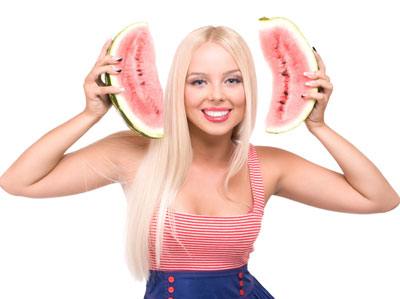
- SUPPORTS SKIN HEALTH
Watermelon supports skin health by hydrating with its high-water content, promoting collagen production with vitamin C, and protecting against damage with antioxidants like lycopene and vitamins A and C. These components help maintain skin elasticity, reduce inflammation, and protect against environmental stressors like UV damage, which can help with fine lines, wrinkles, and a brighter complexion. - HYDRATES THE BODY
Watermelon hydrates the body because it is composed of about 92% water. This high-water content helps replenish fluids lost through sweat, urination, and breathing. Additionally, watermelon contains electrolytes like potassium and magnesium, which are crucial for maintaining fluid balance. - RICH IN ANTIOXIDANTS
Watermelon is rich in antioxidants like lycopene, vitamin C, and beta-carotene, which help protect cells from damage by free radicals. These antioxidants are linked to a lower risk of certain cancers and heart disease, as well as a reduced risk of stroke. Lycopene is a particularly potent antioxidant found in higher concentrations in watermelon. - PROMOTES BLOOD FLOW
Watermelon promotes blood flow due to its high content of the amino acid citrulline, which helps widen blood vessels by increasing nitric oxide (NO) production. This vasodilation can lead to improved blood pressure, reduced arterial stiffness, and enhanced overall vascular function. - HELPS WITH WEIGHT MANAGEMENT
Watermelon helps with weight management due to its high water and fiber content, which promotes fullness and hydration while being low in calories. It also contains the amino acid arginine, which may help increase metabolism and burn fat. While watermelon is a healthy addition to a diet, an exclusive "watermelon diet" is not recommended as it lacks essential nutrients.
Nutrient Database – USDA (United States Department of Agriculture)
Reference Values for Nutrition – FDA U.S. Food and Drug Administration
Watermelon hydrates the body - because it is composed of about 92% water. This high-water content helps replenish fluids lost through sweat, urination, and breathing. Additionally, watermelon contains electrolytes like potassium and magnesium, which are crucial for maintaining fluid balance.
Supports heart function - Watermelon supports heart function primarily through its high content of the amino acid citrulline, which helps improve blood flow and lower blood pressure by boosting the production of nitric oxide. It also contains lycopene, an antioxidant that may lower the risk of heart attack and reduce inflammation.
Promotes blood flow - Watermelon promotes blood flow due to its high content of the amino acid citrulline, which helps widen blood vessels by increasing nitric oxide (NO) production. This vasodilation can lead to improved blood pressure, reduced arterial stiffness, and enhanced overall vascular function.
Rich in antioxidants - Watermelon is rich in antioxidants like lycopene, vitamin C, and beta-carotene, which help protect cells from damage by free radicals. These antioxidants are linked to a lower risk of certain cancers and heart disease, as well as a reduced risk of stroke. Lycopene is a particularly potent antioxidant found in higher concentrations in watermelon than in most other fruits and vegetables.
May reduce disease risk - Watermelon may reduce disease risk due to its high levels of antioxidants, like lycopene, which protect against cell damage, and the amino acid citrulline, which promotes good cardiovascular health. Regular consumption of watermelon has been linked to lower blood pressure, improved cholesterol levels, and a reduced risk of chronic diseases such as certain cancers and type 2 diabetes.
Supports the immune system - Watermelon supports the immune system due to its rich content of vitamins A and C, antioxidants like lycopene, and high-water content. Vitamin C helps the body produce white blood cells, while vitamin A supports immune regulation. Lycopene has anti-inflammatory properties that can help the body fight infection and reduce inflammation. Staying hydrated with watermelon's high-water content is also crucial for proper immune function.
Aids digestion - Watermelon aids digestion because of its high-water content and fiber, which help with hydration, bowel regularity, and waste movement. However, eating too much at once may cause digestive issues like gas, bloating, or diarrhoea due to its high fructose content, particularly for those with sensitive stomachs or IBS.
Reduces muscle soreness - Watermelon helps reduce muscle soreness due to its high concentration of L-citrulline, an amino acid that promotes blood flow and can reduce muscle damage after exercise. It also provides hydration, electrolytes, and antioxidants, all of which aid in muscle recovery.
Helps with weight management - Watermelon helps with weight management due to its high water and fiber content, which promotes fullness and hydration while being low in calories. It also contains the amino acid arginine, which may help increase metabolism and burn fat. While watermelon is a healthy addition to a diet, an exclusive "watermelon diet" is not recommended as it lacks essential nutrients.
Supports skin health - Watermelon supports skin health by hydrating with its high-water content, promoting collagen production with vitamin C, and protecting against damage with antioxidants like lycopene and vitamins A and C. These components help maintain skin elasticity, reduce inflammation, and protect against environmental stressors like UV damage, which can help with fine lines, wrinkles, and a brighter complexion.
Potential protection against certain cancers - Watermelon, particularly due to its high concentration of the antioxidant lycopene, may offer potential protection against certain cancers, with the strongest evidence relating to prostate cancer.
